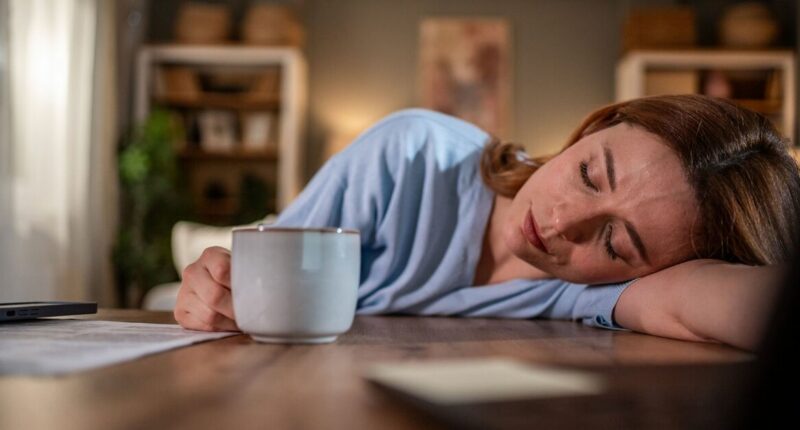Share this @internewscast.com
Individuals who find themselves waking up in the middle of the night can potentially enhance their sleep by making a simple adjustment to their bedtime habits, an expert advises. While insomnia is something that can affect anyone, with an estimated 40% of UK adults experiencing at least one symptom daily, studies indicate that sleep issues are most prevalent among women.
Curley Superintendent Pharmacist Sobia Qasim explains: “Research indicates that women are considerably more prone than men to waking during the night, with certain studies suggesting they might face double the likelihood due to sleep disturbances.”
Fortunately, several simple tips, such as dimming lights one hour before bed, could help women struggling to enjoy a good night’s sleep.
Offering advice, Sobia shared four reasons why women might be more likely to wake up in the night and how to prevent it from happening.
The stress load
Sobia elaborated: “Regrettably, women’s mental load does not simply shut down at bedtime. Their minds remain active, juggling thoughts about school events, meal planning, and work management, even as they attempt to unwind in the evening. This is referred to as ‘cognitive arousal,’ where stress and responsibilities replay in the mind during sleep.
“The primary stress hormone, cortisol, tends to elevate more in women in response to emotional stressors, complicating the process of falling back asleep once awakened. Research has found that women have a 40% higher likelihood of experiencing insomnia compared to men due to elevated stress levels.”
She added: “Reducing bedtime ‘mental load’ can be effectively managed by jotting down a to-do list or worries just before bed, conveying to the brain that tasks can be deferred until morning, which is okay. Accompany this with a brief deep breathing exercise, such as inhaling slowly through the nose for four seconds, holding for seven seconds, and fully exhaling through the mouth for eight seconds. This practice reduces cortisol levels, facilitating faster sleep onset.”
Circadian rhythms
“There are several neurological differences affecting women’s sleep. Their circadian rhythms are slightly shorter than men’s, which might make them feel tired earlier at night; however, they are also biologically inclined to wake up earlier,” the pharmacist noted.
Sobia advised: “Try to keep a bedtime and wake-up time the same each day, even on weekends, to stabilise your body clock. Also, try to limit evening light exposure by dimming screens and lighting 1 hour before bed, which will help with deep, less easily disturbed sleep stages.”
Bladder sensitivity
Sobia said: “Nocturia is another reason women find that their sleep is broken. Hormonal changes, pregnancy, and childbirth all affect bladder function and pelvic floor strength, making it more likely for night-time bathroom trips. The issue is that by the time women have woken up, it takes them a longer amount of time to get back into a deep sleep than men.
“In a survey, nearly half of women over 40 reported waking up at least once in the night to use the bathroom, and this figure rises during pregnancy and after menopause. Men also experience nocturia, especially with age; women are affected more at a younger age, and it tends to worsen, disrupting sleep cycles.”
She shared: “A simple way to reduce the night-time bathroom trips is to avoid drinking fluids like caffeine and alcohol at least 2 to 3 hours before bed, as both can irritate the bladder. You can also try pelvic floor exercises regularly to improve bladder control and reduce nocturia over time.”
Sharing a bed
“Bed-sharing may bring the relationship closer; however, it also causes many disturbances,” the expert pointed out. “Women are significantly more likely than men to be woken up by their partner’s snoring or movement, as research suggests.
“As women have a light sleep cycle, even the smallest of disruptors, such as late-night phone scrolling, a shift in position, or sleep talking, are enough to fully wake them up. In one survey, 55% of people reported that snoring is one of the biggest sleep disturbers.”
Her advice was to use firmer mattresses or memory foam to minimise movement transfer and keep separate blankets. Sobia added: “If you sleep next to a snorer, use nasal strips or a humidifier, and don’t hesitate to sleep in separate beds if needed, to prioritise good sleep quality.”
















